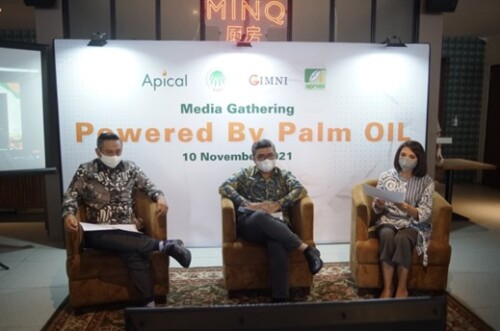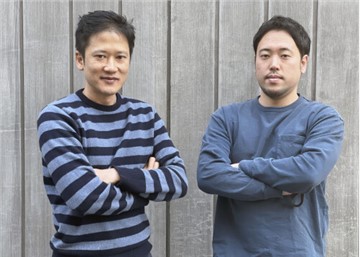
Contents Provided by Media OutReach
JAKARTA, INDONESIA/SINGAPORE - Media OutReach - 18 November 2021 - Exporter of sustainable palm oil, Apical Group joined forces with the Roundtable of Sustainable Palm Oil (RSPO), the Indonesian Vegetable Oil Industry Association (GIMNI), Indonesian Association of Biofuel Producers (APROBI), and a number of key opinion leaders from various industries, to launch a sustainable palm oil initiative "Powered by Palm Oil".

Through this initiative, Apical Group, a member of the RGE group of resources-based companies founded by Sukanto Tanoto in 1973, seeks to improve sustainable business practices and raise greater awareness, especially among the younger generation, on the importance and impact of palm oil on communities and everyday life.
Bernard Riedo, RGE Palm Business Director said, "This initiative allows us to share knowledge and insights with Indonesians, especially the younger generation, on the prevalence of palm oil in everyday life and its many uses. As we commemorate Heroes' Day (Hari Pahlawan) in Indonesia today, we have hope that the younger generation can become agents of change in promoting sustainable palm oil."
Margareth Naulie Panggabean, Outreach and Engagement RSPO Indonesia said, "We support Apical to continue to cultivate sustainable palm oil while also educating the younger generation that buying products that use certified sustainable palm oil is the best choice you can make in supporting a more sustainable palm oil industry."
Sahat Sinaga, Executive Director of GIMNI observed that for the past eight years, palm oil has continued to remain a major Indonesian export other than coal. The palm oil industry provides employment for many and is a source of foreign exchange. It remains important for Indonesians to better understand how many economic activities are heavily supported by palm oil. Additionally, oil palms grow well in tropical areas with high rainfall, and their production is able to meet national and global needs.
"From the total 47 million tons of Crude Palm Oil (CPO) produced by Indonesia, 20 million tons are for domestic consumption, of which 9 million tons are used for biodiesel, 7 million tons for food, and 2.5 million tons for oleochemical use, and the rest for other uses. Palm oil is therefore very important for this nation. The solution is not to replace palm oil with other vegetable oils, but how to make this industry more sustainable and this is a big challenge the younger generation of Indonesians will face," added Sahat.
Compared to other countries, Indonesia is more advanced in its use of new and renewable energy, such as biodiesel. Jummy Bismar Martua Sinaga, Head of Research & Technology APROBI explained, "We have to optimize Indonesia's palm oil as a resource. The B30 program provides employment for more than one million workers and increases farmers' incomes. APROBI also wants to share the information that palm oil is not only used for food but is also a source of energy."
At the event, Apical introduced four key opinion leaders from the "Palm Oil Nation" campaign consisting of practitioners from various industries, such as Kwik Wan Tien, General Manager of Nutrifood (WRP brands); Anisa Sulandana. Brahmantyo, De La House Brand & Product Marketing Director and advocate of the use of sustainable palm oil; Tigran Denre Sonda, an exporter of Harumas cooking oil, an Apical product; and Ryan Haryanto, an Asian Formula Renault driver who supports the use of biodiesel from palm oil as an effort to strengthen energy security.
The campaign has useful content that will be published every two weeks from November 10, 2021 on all Apical Group social media channels. This marks one of Apical's many efforts to engage the younger generation in Indonesia under its #Apicalpeduli (Apical Cares) movement. Since 2020, Apical has actively engaged communities through various activities to spread positive messages and build resilience.
About Apical
Apical Group is one of the largest palm oil exporters in Indonesia, owning and controlling a broad spectrum of the palm oil business value chain from sourcing to distribution. The company is also involved in the refining, processing of palm oil for domestic use and for international export. Its operations are located in Indonesia, China and Spain, and include six refineries, four biodiesel plants, two oleo chemical plants and a kernel crushing plant. Through joint ventures, Apical also has tolling and distribution operations in India, Pakistan, Philippines and Brazil. Apical's business is built on an extensive sourcing network in Indonesia with integrated refinery assets in strategic locations. This is reinforced by efficient logistics channels supported by Apical's own infrastructure to deliver to a wide range of clients from international trading houses to local industrial buyers. With its unique business model, Apical has been able to control product quality and address sustainability and food safety concerns, while running highly efficient operations in world-class refineries and integrated storage and bulking facilities.
 Apical 2020 Sustainability Report
Apical 2020 Sustainability Report
#Apical






















Latest comments